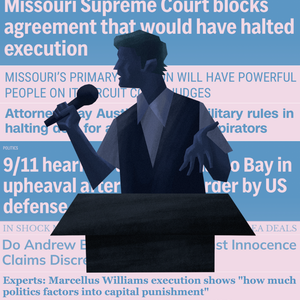
Four African-American death-row prisoners in North Carolina whose death sentences had been overturned for racial discrimination have challenged the constitutionality of subsequent state court rulings that reinstated their death sentences and then denied them a new hearing on their discrimination claims. The four—Marcus Robinson (pictured), Tilmon Golphin, Quintel Augustine, and Christina Walters—had overturned their death sentences in 2012 under the North Carolina Racial Justice Act (RJA), presenting evidence that a multi-decade systematic exclusion of African Americans from death-penalty juries in North Carolina had infected their cases with racial bias. However, the North Carolina Supreme Court vacated those rulings, saying state prosecutors deserved an opportunity to present additional evidence, and the North Carolina legislature repealed the RJA. The trial court then ruled that, because of the repeal, it could no longer hear the prisoners’ cases. Backed by a broad coalition of civil rights groups and several former prosecutors, the prisoners filed briefs in the North Carolina Supreme Court on July 16, 2018 arguing that the lower court ruling violated numerous constitutional guarantees, including due process and the Double Jeopardy clauses of the state and federal constitutions. After nearly three weeks of testimony in Robinson’s case, which detailed state prosecutors’ use of jury strikes in 173 capital trials between 1990 and 2010, Superior Court Judge Gregory Weeks overturned Robinson’s death sentence, finding that the “evidence showed the persistent, pervasive, and distorting role of race in jury selection.” Reviewing expert testimony about prosecutors’ choices to accept or strike more than 7,400 jurors, Weeks determined that prosecutors had systematically excluded black jurors from serving in capital cases “with remarkable consistency across time and jurisdictions.” Based on the same statewide evidence, plus the jury strikes in their cases, Weeks concluded that the death sentences imposed on Golphin, Augustine, and Walters also should be overturned. Prosecutors then persuaded the North Carolina Supreme Court to vacate Weeks’s rulings and send the cases back to the trial court for more evidence. “Lo and behold we get back into Superior Court, and at that point, the position shifts, and it’s well wait a minute, the statute’s been repealed, the courthouse door has been shut, and you are out of luck,” explained Gretchen Engel, director of the Center for Death Penalty Litigation. The prisoners’ appeal drew support from numerous civil rights and law-reform organizations, including the NAACP Legal Defense and Educational Fund (LDF), the North Carolina NAACP, the National Association of Public Defenders, the North Carolina Association of Black Lawyers, the North Carolina Council of Churches, North Carolina Advocates for Justice, the ACLU Capital Punishment Project, and a group of former prosecutors. In a statement, LDF senior deputy director of litigation Jin Hee Lee said: “The continuing stain of racial discrimination not only invalidates the death sentences imposed on these defendants, but it also undermines public confidence in North Carolina’s judicial system as a whole.” Former Virginia Attorney General Mark Earley said, “Whatever one thinks of the death penalty, we should all agree that execution can never be an option when racial stereotypes are used to keep black citizens off capital juries. No civil right is more basic than this.”
(Robert Richardson, 4 inmates on death row seek permanent stays of execution due to racial bias, CBS17, July 17, 2018; Paul Woolverton, Cumberland death row inmates say their rights were violated, Fayetteville Observer, July 17, 2018; Tyler Dukes, Civil rights group: NC death penalty cases rife with racial bias, WRAL.com, Raleigh, July 17, 2018; Amicus Curiae Brief of the NAACP Legal Defense and Educational Fund, Inc., July 16, 2018.) See Race.
Arbitrariness
Oct 04, 2024


